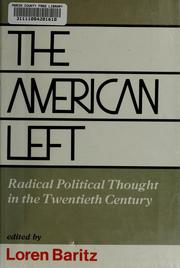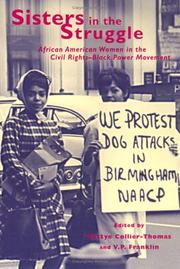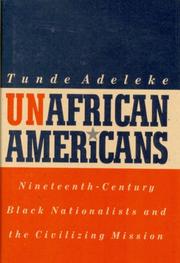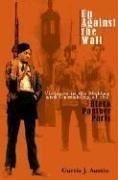| Listing 1 - 10 of 14 | << page >> |
Sort by
|
Book
Year: 1971 Publisher: New York Scribner's
Abstract | Keywords | Export | Availability | Bookmark
 Loading...
Loading...Choose an application
- Reference Manager
- EndNote
- RefWorks (Direct export to RefWorks)
Book
ISBN: 9780415826129 9780415826143 9780203431863 9781135980689 9781135980757 0415826144 0203431863 0415826128 Year: 2016 Publisher: New York London Routledge
Abstract | Keywords | Export | Availability | Bookmark
 Loading...
Loading...Choose an application
- Reference Manager
- EndNote
- RefWorks (Direct export to RefWorks)
African Americans --- Civil rights movements --- Black power --- Civil rights --- History --- 20th century --- United States --- African Americans - Civil rights - History - 20th century --- Civil rights movements - United States - History - 20th century --- Black power - United States - History - 20th century

ISBN: 0465001440 Year: 1971 Publisher: New York London Basic Books
Abstract | Keywords | Export | Availability | Bookmark
 Loading...
Loading...Choose an application
- Reference Manager
- EndNote
- RefWorks (Direct export to RefWorks)
World War, 1939-1945 --- Socialism --- Sexual ethics --- Black power --- Student movements --- Debs, Eugene Victor --- European War, 1914-1918 --- Socialist Labour Party --- Socialist Party --- Feminism
Book
ISBN: 0252099559 9780252099557 9780252041006 0252041003 9780252082498 0252082494 Year: 2017 Publisher: Urbana, Chicago, Springfield, Illinois : University of Illinois Press,
Abstract | Keywords | Export | Availability | Bookmark
 Loading...
Loading...Choose an application
- Reference Manager
- EndNote
- RefWorks (Direct export to RefWorks)
A 2008 cover of The New Yorker featured a much-discussed Black Power parody of Michelle and Barack Obama. The image put a spotlight on how easy it is to flatten the Black Power movement as we imagine new types of blackness. Margo Natalie Crawford argues that we have misread the Black Arts Movement's call for blackness. We have failed to see the movement's anticipation of the 'new black' and 'post-black.' 'Black Post-Blackness' compares the black avant-garde of the 1960s and 1970s Black Arts Movement with the most innovative spins of 21st century black aesthetics. Crawford zooms in on the 1970s second wave of the Black Arts Movement and shows the connections between this final wave of the Black Arts movement and the early years of 21st century black aesthetics.
Black nationalism. --- Black separatism --- Nationalism --- Nationalism, Black --- Separatism, Black --- Black power --- Blacks --- Politics and government --- Race identity --- Black people --- African-American literature and culture --- Expanding and exploding the boundaries
Book
ISBN: 9781568585550 Year: 2016 Publisher: New York Nation Books
Abstract | Keywords | Export | Availability | Bookmark
 Loading...
Loading...Choose an application
- Reference Manager
- EndNote
- RefWorks (Direct export to RefWorks)
"October 2016 marks the fiftieth anniversary of the founding of the Black Panther Party. Photojournalist Bryan Shih, who has been interviewing and taking portraits of the surviving Panthers around the country for years, has partnered with Yohuru Williams, dean and history professor at Fairfield University, to deliver the definitive celebration of the Black Panthers. Part oral history, part scrapbook, this is a beautifully produced book of forty-five black-and-white portraits of the Panthers today, alongside interviews with the surviving Panthers, archival images, Black Panther Party pamphlets and speeches, as well as essays by contributors such as Peniel Joseph, Alondra Nelson, Rhonda Williams, and other high-profile scholars to provide background and context."--Provided by publisher.
Black Panther Party --- History --- Pictorial works --- Interviews --- African American political activists --- African American radicals --- African American social reformers --- Sources --- Black power --- United States --- 20th century --- African Americans --- Politics and government --- History.

ISBN: 0814716032 Year: 2001 Publisher: New York ; London : New York University Press,
Abstract | Keywords | Export | Availability | Bookmark
 Loading...
Loading...Choose an application
- Reference Manager
- EndNote
- RefWorks (Direct export to RefWorks)
Women were at the forefront of the civil rights struggle, but their individual stories were rarely heard. Only recently have historians begun to recognize the central role women played in the battle for racial equality. This book represents the coming age of African-American women's history and presents stories that point the way to future study.
African American women civil rights workers --- African American women political activists --- African Americans --- Black power --- Civil rights movements --- African American leadership --- African American women. --- History --- Civil rights --- United States --- Race relations. --- Race relations --- 20th century --- Biography --- Black Panther Party --- Clark, Septima Poinsette --- Hamer, Fannie Lou --- Richardson, Gloria St. Clair --- Robinson, Ruby Doris Smith

ISBN: 0813157536 0813170001 9780813170008 081312056X 9780813120560 0813189667 Year: 1998 Publisher: Lexington University Press of Kentucky
Abstract | Keywords | Export | Availability | Bookmark
 Loading...
Loading...Choose an application
- Reference Manager
- EndNote
- RefWorks (Direct export to RefWorks)
Though many scholars will acknowledge the Anglo-Saxon character of black American nationalism, few have dealt with the imperialistic ramifications of this connection. Now, Nigerian-born scholar Tunde Adeleke reexamines nineteenth-century black American nationalism, finding not only that it embodied the racist and paternalistic values of Euro-American culture but also that nationalism played an active role in justifying Europe's intrusion into Africa.Adeleke looks at the life and work of Martin Delany, Alexander Crummell, and Harry McNeal Turner, demonstrating that as supporters of the mission
Pan-Africanism --- African Americans --- Black nationalism --- African relations --- African cooperation --- Regionalism (International organization) --- Afro-Americans --- Black Americans --- Colored people (United States) --- Negroes --- Africans --- Ethnology --- Blacks --- Black separatism --- Nationalism --- Nationalism, Black --- Separatism, Black --- Black power --- History --- Relations with Africans --- Politics and government --- Race identity --- United States --- 19th century --- Imperialism --- Black people

ISBN: 1299401945 1610754441 9781610754446 1557288275 9781557288271 1557288275 9781557288271 9781557288752 1557288755 9781299401945 Year: 2006 Publisher: Fayetteville University of Arkansas Press
Abstract | Keywords | Export | Availability | Bookmark
 Loading...
Loading...Choose an application
- Reference Manager
- EndNote
- RefWorks (Direct export to RefWorks)
African Americans --- Black power --- Political violence --- Violence --- Political crimes and offenses --- Terrorism --- Politics and government --- History --- Black Panther Party --- Black Panthers --- BPP (Black Panther Party) --- B.P.P. (Black Panther Party) --- Black Panther Party for Self-Defense --- History. --- United States --- Race relations --- Biography --- 20th century
Book
ISBN: 0820349844 9780820349848 9780820335124 0820335126 0820354767 Year: 2016 Publisher: Athens, GA : The University of Georgia Press,
Abstract | Keywords | Export | Availability | Bookmark
 Loading...
Loading...Choose an application
- Reference Manager
- EndNote
- RefWorks (Direct export to RefWorks)
""New Negro Politics in the Jim Crow South" narrates the story of New Negro political culture from the perspective of the black South. It details how the development and maturation of New Negro politics and thought was shaped not only by New York-based intellectuals and revolutionary transformations in Europe, but also by people, ideas, and organizations rooted in the South. Harold's aim is not to devalue the importance of the North or Europe during this period of black political and cultural renaissance. Instead, her probe into some of the critical events and developments below the Mason-Dixon-Line sharpen our vision of how many black activists, along with particular segments of the white American Left, arrived at certain theoretical conclusions and political choices regarding the politics of race, challenges to capitalist political economy, and alternative visions of nation. The book considers southern black political movements during a period dominated by the study of the urban North (and specifically the Harlem Renaissance). Focusing on Garveyites, A. Philip Randolph's militant unionists, and black anti-imperialist protest groups, among others, Harold argues that the South was a largely overlooked "incubator of black protest activity" between World War I and the Great Depression."--Provided by publisher.
African Americans --- Black nationalism --- Labor movement --- Civil rights movements --- African American intellectuals --- Black separatism --- Nationalism --- Nationalism, Black --- Separatism, Black --- Black power --- Blacks --- Labor and laboring classes --- Social movements --- Afro-Americans --- Black Americans --- Colored people (United States) --- Negroes --- Africans --- Ethnology --- Intellectual life. --- History --- Race identity --- Politics and government --- Southern States --- Race relations --- 20th century --- Intellectual life --- 1865-1950 --- Black people
Book
ISSN: 20305702 ISBN: 9782806101686 2806101689 Year: 2014 Volume: 15 Publisher: Louvain-la-Neuve : Academia-L'Harmattan,
Abstract | Keywords | Export | Availability | Bookmark
 Loading...
Loading...Choose an application
- Reference Manager
- EndNote
- RefWorks (Direct export to RefWorks)
Le mouvement noir apparaît au Brésil dans les années 1970-1980, en écho au mouvement des droits civils aux États-Unis. Puis, il se manifeste sous la forme d'actions affirmatives notamment sous le gouvernement du Parti des travailleurs. Cette promotion de l'égalité raciale fait ressortir une volonté de réparation du passé depuis l'esclavage à l'époque coloniale. ©Electre 2015
Blacks --- Black militant organizations --- History --- Race identity --- Civil rights --- Attitudes --- Brazil --- Race relations --- Noirs -- Brésil --- Black power --- Réparations --- Noirs -- Brésil --- Noirs --- Esclavage --- Conditions sociales --- Identité collective --- Brésil --- Relations interethniques --- Identité collective --- Brésil --- Conditions sociales. --- Identité collective. --- Relations interethniques. --- Blacks - Brazil - History - 21st century --- Blacks - Race identity - Brazil - History - 21st century --- Black militant organizations - Brazil - History - 21st century --- Blacks - Civil rights - Brazil - History - 21st century --- Blacks - Brazil - Attitudes - History - 21st century --- Brazil - Race relations - History - 21st century
| Listing 1 - 10 of 14 | << page >> |
Sort by
|

 Search
Search Feedback
Feedback About UniCat
About UniCat  Help
Help News
News